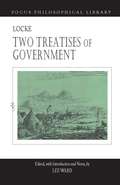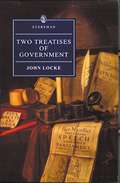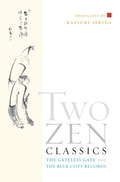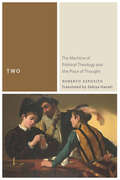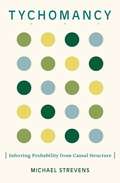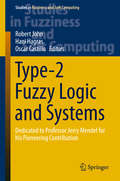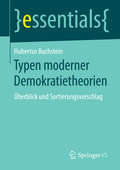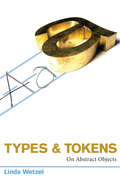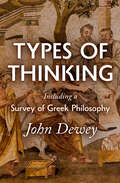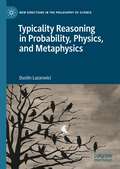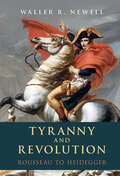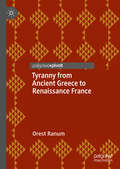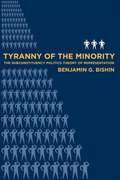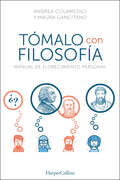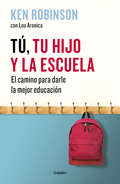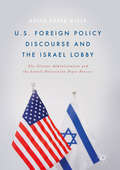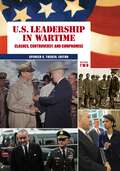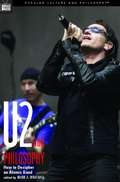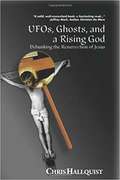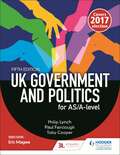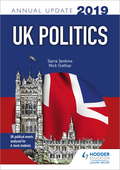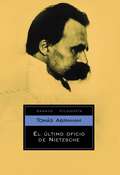- Table View
- List View
Two Treatises of Government
by John Locke Lee WardDesigned to serve the needs of students confronting Locke's political thought for the first time, Lee Ward's edition offers a faithful text of Two Treatises of Government with modernized spelling and punctuation. Its Editor's Introduction outlines the main arguments of these works, illustrates the conceptual thread uniting the less frequently read First Treatise with the far more famous Second Treatise, and locates Locke's work amid the turbulent constitutional battles of 1690s England. Helpful notes at the foot of the page, a Thematic Index, and an up-to-date Bibliography are also provided.
Two Treatises of Government
by John Locke Mark GoldieThis is the first modernized edition of the Two Treatises based on Locke's own corrected text as he left it for posterity at his death. Includes introduction, chronology of Locke's life and times, extensive glossary and key word index.
Two Zen Classics
by Katsuki SekidaThe strange verbal paradoxes called koans have been used traditionally in Zen training to help students attain a direct realization of truths inexpressible in words. The two works translated in this book, Mumonkan (The Gateless Gate ) and Hekiganroku (The Blue Cliff Record), both compiled during the Song dynasty in China, are the best known and most frequently studied koan collections, and are classics of Zen literature. They are still used today in a variety of practice lineages, from traditional zendos to modern Zen centers. In a completely new translation, together with original commentaries, the well-known Zen teacher Katsuki Sekida brings to these works the same fresh and pragmatic approach that made his Zen Training so successful. The insights of a lifetime of Zen practice and his familiarity with both Eastern and Western ways of thinking make him an ideal interpreter of these texts.
Two: The Machine of Political Theology and the Place of Thought (Commonalities)
by Roberto EspositoThe debate on “political theology” that ran throughout the twentieth century has reached its end, but the ultimate meaning of the notion continues to evade us. Despite all the attempts to resolve the issue, we still speak its language—we remain in its horizon.The reason for this, says Roberto Esposito, lies in the fact that political theology is neither a concept nor an event; rather, it is the pivot around which the machine of Western civilization has revolved for more than 2,000 years. At its heart stands the juncture between universalism and exclusion, unity and separation: the tendency of the Two to make itself into One by subordinating one part to the domination of the other. All the philosophical and political categories that we use, starting with the Roman and Christian notion of “the person,” continue to reproduce this exclusionary dispositif.To take our departure from political theology, then—the task of contemporary philosophy—we must radically revise our conceptual lexicon. Only when thought has been returned to its rightful “place”—connected to the human species as a whole rather than to individuals—will we be able to escape from the machine that hasimprisoned our lives for far too long.
Tychomancy
by Michael StrevensTychomancy-meaning the divination of chances-presents a set of rules for inferring the physical probabilities of outcomes from the causal or dynamic properties of the systems that produce them. Probabilities revealed by the rules are wide-ranging: they include the probability of getting a 5 on a die roll, the probability distributions found in statistical physics, and the probabilities that underlie many prima facie judgments about fitness in evolutionary biology. Michael Strevens makes three claims about the rules. First, they are reliable. Second, they are known, though not fully consciously, to all human beings: they constitute a key part of the physical intuition that allows us to navigate around the world safely in the absence of formal scientific knowledge. Third, they have played a crucial but unrecognized role in several major scientific innovations. A large part of Tychomancy is devoted to this historical role for probability inference rules. Strevens first analyzes James Clerk Maxwell’s extraordinary, apparently a priori, deduction of the molecular velocity distribution in gases, which launched statistical physics. Maxwell did not derive his distribution from logic alone, Strevens proposes, but rather from probabilistic knowledge common to all human beings, even infants as young as six months old. Strevens then turns to Darwin’s theory of natural selection, the statistics of measurement, and the creation of models of complex systems, contending in each case that these elements of science could not have emerged when or how they did without the ability to eyeball the values of physical probabilities.
Type Theory and Formal Proof
by Rob Nederpelt Herman GeuversType theory is a fast-evolving field at the crossroads of logic, computer science and mathematics. This gentle step-by-step introduction is ideal for graduate students and researchers who need to understand the ins and outs of the mathematical machinery, the role of logical rules therein, the essential contribution of definitions and the decisive nature of well-structured proofs. The authors begin with untyped lambda calculus and proceed to several fundamental type systems, including the well-known and powerful Calculus of Constructions. The book also covers the essence of proof checking and proof development, and the use of dependent type theory to formalise mathematics. The only prerequisite is a basic knowledge of undergraduate mathematics. Carefully chosen examples illustrate the theory throughout. Each chapter ends with a summary of the content, some historical context, suggestions for further reading and a selection of exercises to help readers familiarise themselves with the material.
Type-2 Fuzzy Logic and Systems: Dedicated to Professor Jerry Mendel for his Pioneering Contribution (Studies in Fuzziness and Soft Computing #362)
by Oscar Castillo Hani Hagras Robert JohnThis book explores recent perspectives on type-2 fuzzy sets. Written as a tribute to Professor Jerry Mendel for his pioneering works on type-2 fuzzy sets and systems, it covers a wide range of topics, including applications to the Go game, machine learning and pattern recognition, as well as type-2 fuzzy control and intelligent systems. The book is intended as a reference guide for the type-2 fuzzy logic community, yet it aims also at other communities dealing with similar methods and applications.
Typen moderner Demokratietheorien: Überblick und Sortierungsvorschlag (essentials)
by Hubertus BuchsteinDas essential bietet einen kompakten Überblick über die neuere Entwicklung der Demokratietheorie und nimmt eine prägnante Sortierung der gegenwärtigen Theorien in diesem Bereich vor. Hubertus Buchstein erläutert die methodischen Unterschiede zwischen den konkurrierenden demokratietheoretischen Ansätzen und stellt vier grundlegende Typen moderner Demokratietheorien vor: historische, empirische, formale und normative Demokratietheorien. Viele Debatten in der Öffentlichkeit, der Politischen Bildung und der Politikwissenschaft über die Demokratie lassen sich mit mehr Gewinn führen, wenn man die unterschiedlichen Blickwinkel der vier Typen beachtet. Dieses essential liefert einen wichtigen Beitrag dazu.
Types and Tokens: On Abstract Objects
by Linda WetzelA consideration of the distinction between the spatiotemporal furniture of the world (tokens) and the types of which they are instances, and an argument that types exist.There is a widely recognized but infrequently discussed distinction between the spatiotemporal furniture of the world (tokens) and the types of which they are instances. Words come in both types and tokens—for example, there is only one word type 'the' but there are numerous tokens of it on this page—as do symphonies, bears, chess games, and many other types of things. In this book, Linda Wetzel examines the distinction between types and tokens and argues that types exist (as abstract objects, since they lack a unique spatiotemporal location). Wetzel demonstrates the ubiquity of references to (and quantifications over) types in science and ordinary language; types have to be reckoned with, and cannot simply be swept under the rug. Wetzel argues that there are such things as types by undermining the epistemological arguments against abstract objects and offering extended original arguments demonstrating the failure of nominalistic attempts to paraphrase away such references to (and quantifications over) types. She then focuses on the relation between types and their tokens, especially for words, showing for the first time that there is nothing that all tokens of a type need have in common other than being tokens of that type. Finally, she considers an often-overlooked problem for realism having to do with types occurring in other types (such as words in a sentence) and proposes an important and original solution, extending her discussion from words and expressions to other types that structurally involve other types (flags and stars and stripes; molecules and atoms; sonatas and notes).
Types of Thinking Including a Survey of Greek Philosophy
by John DeweyA lost series of lectures on the history of philosophy, first delivered in China, now available in English for the first time.This volume reconstructs a series of lectures delivered by John Dewey during his historic trip to China. Though Dewey&’s original notes were lost, Prof. Robert W. Clopton and Dr. Tsuin-Chen Ou were able to translate his works as they appeared in Chinese newspapers.Beyond their historical significance, these lectures show Dewey at the height of his power, discussing and criticizing various schools of philosophy. This includes a brief but comprehensive account of Greek philosophy from the pre-Socratics through Aristotle. Dewey also discusses his own experimental thinking, presenting his position in systematic form for the first time. &“The most complete presentation of Dewey&’s theory of the development of philosophy, in prose simpler and clearer than he himself ever provided . . . Types of Thinking deserves a place in every subject collection.&” —Library Journal
Typicality Reasoning in Probability, Physics, and Metaphysics (New Directions in the Philosophy of Science)
by Dustin LazaroviciThis book provides a comprehensive investigation into the concept of typicality and its significance for physics and the philosophy of science. It identifies typicality as a fundamental way of reasoning, central to how natural laws explain and are tested against phenomena. The book discusses various applications of typicality to foundational questions in physics and beyond.These include:a unified interpretation of objective probabilities in classical mechanics and quantum mechanicsa detailed discussion of Boltzmann's statistical mechanics, entropy, and the second law of thermodynamicsa novel account of the asymmetry of causation and the arrow of time Finally, the book turns to the question: "What are laws of nature"? It argues that typicality extends to a powerful way of reasoning in metaphysics that can and should inform our commitments about the fundamental ontology of the world. On this basis, it develops an argument against the Humean best system account, according to which laws of nature are merely an efficient summary of contingent regularities.
Tyranny and Revolution: Rousseau to Heidegger
by Waller R. NewellThe Philosophy of Freedom from Rousseau to Heidegger launched a great protest against modern liberal individualism, inspired by the virtuous political community of the ancient Greeks. Hegel argued that the progress of history was gradually bringing about greater freedom and restoring our lost sense of community. But his successors Marx, Nietzsche and Heidegger rejected Hegel's version of the end of history with its legitimization of the bourgeois nation-state. They sought to replace it with ever more utopian, apocalyptic and illiberal visions of the future: Marx's Socialism, Nietzsche's Overman, and Heidegger's commitment to Nazism. This book combines an exceptionally clear and rich study of these thinkers with a deep dive into the extent to which their views fed the political catastrophes of revolution, tyranny and genocide, including the Jacobins, Bolsheviks, Nazis, Khmer Rouge, ISIS and populist nationalism, but argues that the Philosophy of Freedom remains indispensable for understanding today's world.
Tyranny from Ancient Greece to Renaissance France
by Orest RanumThis Palgrave Pivot examines how prominent thinkers throughout history, from ancient Greece to sixteenth-century France, have perceived tyrants and tyranny. Ancient philosophers such as Plato and Aristotle were the first to build a vocabulary for tyrants and the forms of government they corrupted. Thirteenth century analyses of tyranny by Thomas Aquinas and John of Salisbury, revived from Antiquity, were recast as short observations about what tyrants do. They claimed that tyrants govern for their own advantage, not for the people. Tyrants could be usurpers, increase taxes, and live in luxury. The list of tyrannical actions grew over time, especially in periods of turmoil and civil war, often raising the question: When can a tyrant be legitimately deposed or killed? In offering a brief biography of these political philosophers, including Machiavelli, Erasmus, More, Bodin, and others, along with their views on tyrannical behavior, Orest Ranum reveals how the concept of tyranny has been shaped over time, and how it still persists in political thought to this day.
Tyranny of the Minority: The Subconstituency Politics Theory of Representation
by Benjamin G. BishinWhy do politicians frequently heed the preferences of small groups of citizens over those of the majority? Breaking new theoretical ground, Benjamin Bishin explains how the desires of small groups, which he calls "subconstituencies," often trump the preferences of much larger groups. Demonstrating the wide applicability of his "unified theory of representation," Bishin traces politicians' behavior in connection with a wide range of issues, including the Cuban trade embargo, the extension of hate-crimes legislation to protect gay men and lesbians, the renewal of the assault-weapons ban, and abortion politics. In the process, he offers a unique explanation of when, why, and how special interests dominate American national politics.
Tyranny: A New Interpretation
by Waller R. NewellThis is the first comprehensive exploration of ancient and modern tyranny in the history of political thought. Waller R. Newell argues that modern tyranny and statecraft differ fundamentally from the classical understanding. Newell demonstrates a historical shift in emphasis from the classical thinkers' stress on the virtuous character of rulers and the need for civic education to the modern emphasis on impersonal institutions and cold-blooded political method. By diagnosing the varieties of tyranny from erotic voluptuaries like Nero, the steely determination of reforming conquerors like Alexander the Great and Julius Caesar and modernizing despots such as Napoleon and Ataturk to the collectivist revolutions of the Jacobins, Bolsheviks, Nazis and Khmer Rouge, Newell shows how tyranny is every bit as dangerous to free democratic societies today as it was in the past.
Tómalo con filosofía
by Thomas NelsonSiguiendo el ejemplo de las escuelas más antiguas, este ensayo multifacético nos muestra cómo la filosofía todavía puede impactar poderosamente nuestras vidas como un juego serio conducido sobre nuestra existencia y nuestro camino. La filosofía es un arte de vivir en armonía, una educación y entrenamiento de uno mismo, para florecer en nuestro ser más compuesto y verdadero, para encontrar nuestro lugar en el mundo.Following the example of the oldest schools, this multifaceted essay shows us how philosophy can still powerfully impact our lives as a serious game played on our existence and our path. Philosophy is an art of living in harmony, an education and training of oneself, to flourish in our most serene and true being, to find our place in the world.
Tú, tu hijo y la escuela: El camino para darle la mejor educación
by Sir Ken RobinsonUn libro esencial que orientará a los padres sobre cómo proporcionar a sus hijos la mejor educación para alcanzar una vida plena y feliz. Los padres de hoy en día se encuentran profundamente perdidos en relación a la educación que deben proporcionar a sus hijos, especialmente en un momento en el que todo está muy dominado por la polémica y la política. Sir Ken Robinson, uno de los mayores expertos mundiales en la materia, ha mantenido conversaciones con centenares de padres en las que le han expresado los dilemas y las dudas a los que se enfrentan cuando se plantean la educación de sus hijos: ¿Qué es lo que deberían priorizar?, ¿Cómo pueden saber si una determinada escuela es la más apropiada para sus hijos y, si no lo es, qué pueden hacer para remediarlo? Tú, tu hijo y la escuela es un libro indispensable en el que Sir Ken Robinson plantea principios básicos y aporta consejos prácticos para que los padres puedan apoyar a sus hijos a lo largo del recorrido escolar o incluso fuera de él si deciden seguir una escolarización en casa.
U.S. Foreign Policy Discourse and the Israel Lobby: The Clinton Administration and the Israeli-Palestinian Peace Process
by Keith Peter KielyThis book seeks to debunk the popular myth of an all-powerful pro-Israel lobby. Here, Kiely demonstrates how discourses surrounding American Identity and US foreign policy towards the Israeli-Palestinian conflict, which has deep roots in American historicity, have constructed an understanding of the conflict which is inherently more susceptible to the Israeli narrative. Kiely argues that the so-called power of what other researchers, such as Mearsheimer and Walt (2006, 2007), call ‘The Israel Lobby’ are limited by these discourses. It is the author’s contention that groups such as The American Israel Public Affairs Committee (AIPAC) serve to amplify and reproduce existing representations within these discourses which align the United States and Israel in terms of cultural, historical and political values while simultaneously reinforcing dominant representations of the Palestinian ‘Other’.
U.S. Leadership in Wartime: Volume 1
by Spencer TuckerNow from one of the world's leading publishers of military history comes a breakthrough book on one of the most important and complex aspects of U.S. national defense. U.S. Leadership in Wartime: Clashes, Controversy, and Compromise offers a comprehensive analysis of the characteristics that constitute effective leadership in war and discusses the often contentious relationships between U.S. civilian and military leadership throughout American history.
U.s. Leadership in Wartime: Volume 2
by Spencer TuckerPresident Harry S. Truman's 1951 firing of Douglas MacArthur ended the nation's most famous showdown between a commander in chief and a high-profile officer--but it was far from the only time a chief executive and a general clashed.
U2 and Philosophy: How to Decipher an Atomic Band
by Mark A. WrathallIs it possible to be a committed Christian and a rock superstar? Can political activists make good music? Do hugely successful rock bands really care about AIDS and poverty in Africa, or is it just another image-enhancing schtick?<P><P> U2 and Philosophy ponders these and other seeming dichotomies in the career of the Irish supergroup. For over two decades, U2 has been one of the biggest acts in rock music. They've produced over a dozen platinum and multiplatinum records and won 15 Grammy Awards. Critics everywhere have praised the band's thoughtful, complex lyrics and the artistry of their music. At the same time, Bono, the group's lead singer, has dedicated himself to political and social causes, blurring the line between rock star and respected statesman. Offering fresh insight into the band's music and activism, these thought-provoking essays allows fans to discover philosophy through the eyes of U2, and rediscover U2 through the eyes of philosophers.
UFOs, Ghosts, And A Rising God: Debunking The Resurrection Of Jesus
by Christopher HallquistAt the dawn of the 21st century, interest in the origins of Christianity is as strong as ever. However, discussion tends to be dominated by Evangelicals who assume that the Bible is a historically accurate record, and those who would turn Jesus into a New Age guru. There is also a frequent insistence that the questions surrounding the origins of Christianity are beyond rational analysis. In UFOs, Ghosts, and a Rising God, Chris Hallquist examines what investigations of similar upstart cults have revealed, and then applies these revelations to the origins of the world's largest religion.
UK Government and Politics for AS/A-level (Fifth Edition)
by Paul Fairclough Philip Lynch Toby CooperExam Board: AQA, Edexcel, OCR & WJECLevel: A-levelSubject: PoliticsFirst Teaching: September 2017First Exam: June 2018Inspire political thinking with our bestselling politics textbook and help students get their best grade with political commentary and analysis; , fully updated the new 2017 specifications and including coverage of the June 2017 general election results.Covering key topics for all exam boards, this textbook puts politics in context with topical analysis of politics today and how UK governmental and political history shaped current events and thinking.- Extend knowledge and improve key skills with comprehensive coverage and analysis of relevant political developments, including the 2017 snap election, possible consequences of Brexit, and its effect on Scottish independence- Understand how different topics within the A-level link together with the new Synoptic Links feature- Develop key analysis and evaluation skills with activities and case studies throughout the textbook - look out for Debate, Case Study and Activity boxes- Clarify knowledge and understanding of political language with summaries and explanations of key terms- Test and develop understanding of key topics with exam focus sections tailored to the new Politics specifications
UK Politics Annual Update 2019
by Sarra Jenkins Nick Gallop- Review all the key developments in UK politics from the last year, with expert analysis you can draw on both throughout your course and in the exams- Go beyond your textbooks to build a bank of up-to-date examples and data, helping you developknowledgeable and persuasive arguments- Know how to hit the highest grades with guidance from experienced teachers and authors Sarra Jenkins and Nick Gallop
ULTIMO OFICIO DE NIETZSCHE, EL (EBOOK)
by Tomas AbrahamUn oficio es un modo de pensar la vida, y Nietzsche fue un filosofo con varios oficios. Este libro circular y bicéfalo lo expone el fracaso del primer oficio de Nietzsche y el desencadenamiento de los que siguieron, hasta llegar al ultimo secreto, y volver así al testimonio del primero. En la primera parte, el ensayo de Tomas Abraham traza el diagrama de los oficios en relación con los amores de Nietzsche, que fueron pocos pero cruciales. La presencia diabólica de Wagner -su pater seraficus-, la de Lou Andreas-Salome, que lo rechazo y comprendió con inteligencia piadosa y distante, la de Paúl Ree, que lo libero de su pasión pastoral. Todos estos amores atravesaron su abra. El autor dedica especial atención al amor mas importante de todos, porque fue depredatorio e histórico: el de su hermana. En la segunda parte de editan en su totalidad los artículos de combate en torno a El nacimiento de la tragedia, el libro que dividió las aguas de los oficios. Esta edición -completa, con un riguroso trabajo filosófico y un estudio preliminar de German Sucar- es un trofeo añorado desde hace años por los seguidores de Nietzsche y los amantes de la filosofía. Nietzsche es un filosofo que piensa contra si mismo llevado por la fuerza de una lucidez cruel e inestable. Su pensamiento es una radiación que se expande con la fuerza de la adversidad. Por eso Nietzsche es actual, por que exhibe la pasión del pensar en su irrefrenable camino de crear nuevos espacios y en su repulsa a dejarse domesticar por interpretaciones in vitro. La filosofía de Nietzsche no es un sistema, es el canto de un filosofo solidario que sigue siendo nuestra gran compañía. Por eso este libro: para volver a escuchar esa voz.
